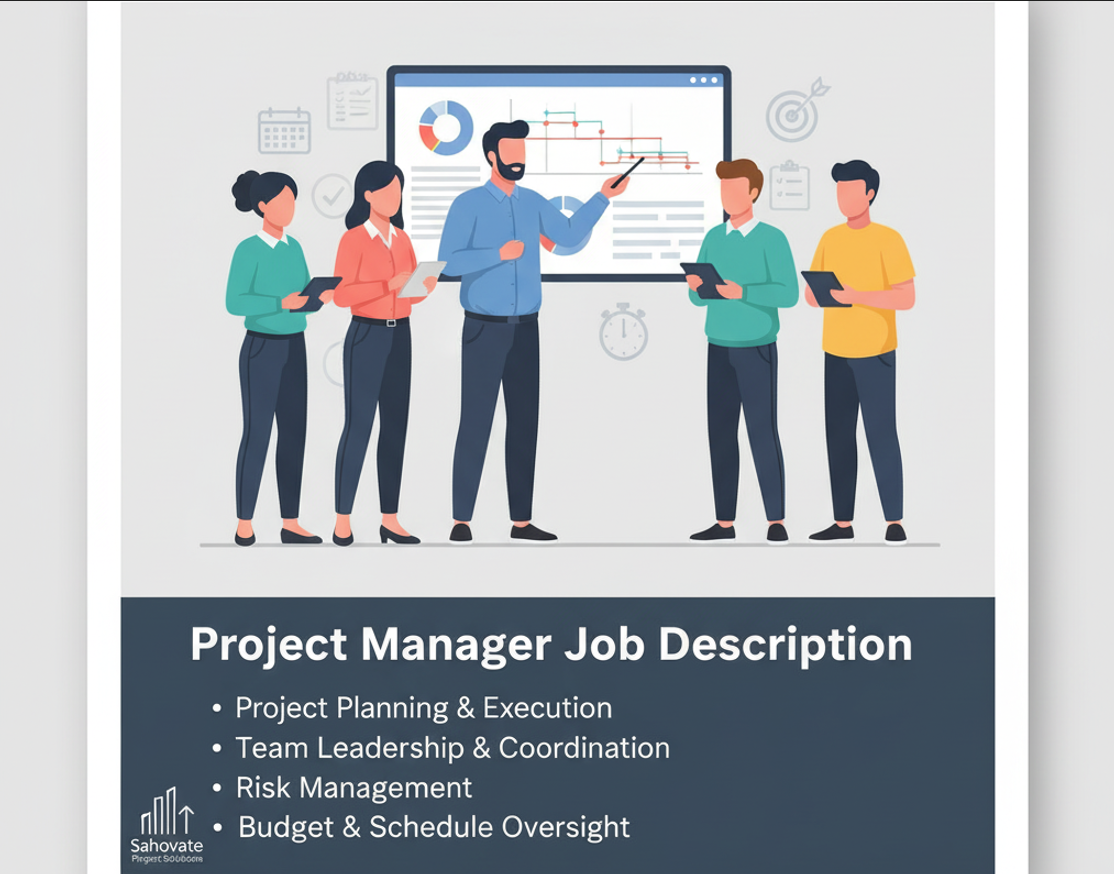Project Manager Job Description
Hello, fantastic readers! We’re thrilled to have you back at Foniatz.com, your trusted partner for practical career advice in Tanzania. With our country’s exciting growth in infrastructure, tech, and development projects, the role of a Project Manager is more vital than ever. Whether you’re an aspiring leader ready to take charge or an employer seeking top talent, this article dives into the Project Manager job description, salary insights for 2025, and the certifications that can set you apart. We’ll keep it straightforward and helpful, drawing from the latest trends to guide your next steps. Let’s build something great together!
What Does a Project Manager Do in Tanzania?
Project Managers in Tanzania are the driving force behind successful initiatives, whether it’s constructing roads in Dodoma, launching health programs in Morogoro, or developing tech solutions in Dar es Salaam. They oversee every stage of a project from planning to completion, ensuring it stays on time, within budget, and meets goals. In sectors such as NGOs, construction, agriculture, and public health, where donor-funded efforts are prevalent, Project Managers coordinate teams, manage risks, and deliver results that benefit communities.
Tanzania’s focus on large-scale projects, such as the Digital Tanzania initiative or rural development, means these professionals often collaborate with local authorities, international partners, and diverse teams. It’s a role that demands strong leadership and adaptability, turning ideas into real impact. If you thrive on organization and problem-solving, this could be the path for you to make a difference.
Key Duties of a Project Manager
Project Managers in Tanzania handle a mix of strategic and hands-on tasks to keep projects moving forward. Based on current job postings and trends, here’s what you might do daily:
- Planning and Organizing: Define project scopes, create timelines, and allocate resources. This includes budgeting and setting milestones, like coordinating with teams for a community health project in rural areas.
- Team Leadership and Coordination: Lead and motivate cross-functional teams, including hiring, training, and resolving conflicts. You’ll collaborate with stakeholders, such as government officials or NGOs, to align everyone.
- Risk Management and Monitoring: Identify potential issues, such as budget overruns or delays caused by adverse weather conditions, and develop practical solutions to mitigate them. Regularly track progress using tools to ensure quality and compliance with Tanzanian regulations.
- Reporting and Communication: Prepare updates for clients or funders, like donor reports for projects in Morogoro. Handle procurement, finance, and admin to keep things running smoothly.
- Project Closure and Evaluation: Wrap up projects by reviewing outcomes, documenting lessons learned, and ensuring handover. In Tanzania, this often involves evidence-based reporting for future improvements.
- Stakeholder Engagement: Foster relationships with local communities, partners, and authorities to support the implementation of initiatives, particularly in multi-country or donor-driven efforts.
Entry-level roles may assist with planning, while experienced managers lead large-scale projects, such as those involving international organizations. Regardless of the level, success stems from staying proactive and team-focused.
Necessary Certifications and Qualifications
To stand out in Tanzania’s competitive job market, a solid education and certifications are key. Employers value those who can prove their skills through recognized credentials. Here’s what you typically need:
- Education: A bachelor’s degree in Project Management, Business Administration, Engineering, Public Health, or a related field from institutions like the University of Dar es Salaam, the Open University of Tanzania, or Ardhi University. A master’s degree, such as the Master of Project Management (MPM) from the Open University, can open doors to senior roles. For entry-level positions, a diploma from the Tanzania Institute of Project Management (TIPM) is a suitable qualification.
- Experience: At least 3-5 years in project roles, with 1-2 years in leadership. Fresh graduates can begin their careers with internships in NGOs or government projects.
- Key Skills: Strong planning, communication (in English and Swahili), risk assessment, and tools like Microsoft Project or Agile methods. Soft skills, such as leadership and adaptability, are essential for Tanzania’s diverse work environments.
- Necessary Certifications: Globally recognized ones boost your profile. The top ones include:
- PMP (Project Management Professional): From PMI, ideal for experienced pros with 36 months of leading projects and 35 hours of training. It’s highly valued in Tanzania for donor-funded work.
- CAPM (Certified Associate in Project Management): Entry-level from PMI, great for beginners without much experience.
- PRINCE2 or Agile Certifications: Useful for structured or flexible projects, offered through local providers like TIPM.
- Local options: Consider TIPM’s professional PMP program or programs from the PMI Tanzania Chapter for networking and preparation.
Register with bodies such as the Engineering Registration Board for engineering-related roles. Certifications like PMP can increase your salary by 20-30% and are often required for international gigs.
Salary Expectations in Tanzania
Salaries for Project Managers in Tanzania vary by experience, location (higher in Dar es Salaam), and sector (NGOs or construction pay well). Based on 2025 data from sources like Glassdoor and World Salaries:
- Entry-Level (0-3 years): TZS 1,000,000 to TZS 2,000,000 per month (about $360-$720 USD). This includes roles in smaller projects with training perks.
- Mid-Level (3-5 years): TZS 2,500,000 to TZS 4,000,000 per month ($900-$1,440 USD), often with bonuses for on-time delivery.
- Senior-Level (5+ years): TZS 4,000,000 to TZS 7,000,000+ per month ($1,440-$2,520+ USD), especially in multinationals or extensive infrastructure, plus benefits like housing allowances.
The average annual income is around TZS 4,000,000, but certified professionals earn more. In cities like Dar es Salaam, add 20-30% to account for demand. Freelance or consultant roles can push earnings higher, and Tanzania’s lower living costs make these figures rewarding.
Opportunities and Challenges
Tanzania’s development boom offers numerous opportunities in NGOs, the government, and the private sector—think projects with SolidarMed or T-MARC. Certifications open doors to international opportunities. Challenges include managing limited resources or coordinating across regions, but these build resilience. Stay ahead by networking through PMI Tanzania or TIPM events.
Thank You for Choosing Foniatz.com. We’re Here for Your Success!
We’re so grateful you visited Foniatz.com, the best resource for warm, reliable career guidance tailored to Tanzanians. As your top partner in professional growth, we’re committed to helping you lead projects that change lives. Whether you’re pursuing a Project Manager role or just exploring, we wish you smooth executions and bright achievements ahead. Come back soon for more insights, and share your thoughts in the comments.
Best wishes from our dedicated team!




